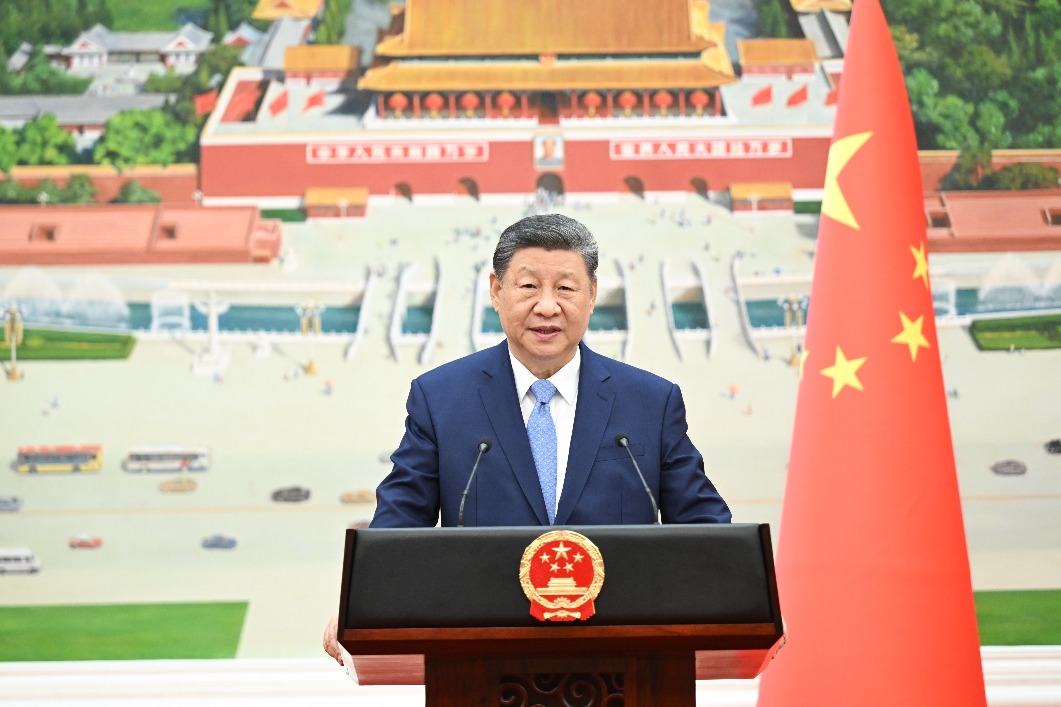Support welcomed for platform economy


The meeting decided that full play should be given to the platform economy's advantages in stabilizing employment and helping small and medium-sized enterprises overcome their difficulties.
It also called for platform enterprises to be encouraged to accelerate breakthroughs in technological research and development for artificial intelligence, cloud computing, blockchain, operating systems and processors.
Long Haibo, a senior researcher at the State Council's Development Research Center, said recent policy developments signify that China will strike a balance between encouraging and regulating the platform economy-sending positive signals to the market in an attempt to further stabilize investor expectations and confidence.
On the one hand, disorderly growth of the platform economy and related monopolistic behavior will be reined in, while on the other, more efforts are needed to unleash the innovative vitality of such an economy, Long said.
"Effectively curbing the disorderly expansion of capital while boosting market confidence is a major test for improving modern supervisory capabilities, and also a prerequisite for deepening reforms to streamline administration and delegate power amid efforts to improve the business environment," Long said.
He added that greater emphasis on the synergy between governance of the platform economy and stability of the capital market is conducive to fostering high-quality development and safeguarding people's interests.
Healthy development of the sector will also further stimulate the innovation of platform-based enterprises amid the pandemic and enhance their global competitiveness, Long said.
Last month, the China Banking and Insurance Regulatory Commission said it would complete rectification of large platform companies, set up "red lights" and "green lights", and implement regular oversight to encourage healthy growth of the platform economy.
In addition, the People's Bank of China, the nation's central bank, said in a statement it would improve its capital governance capability and conduct regular supervision of platform enterprises' financial activities.
Chen Bing, director of the Competition Law Research Center at Nankai University in Tianjin, said the platform economy is an important force in stabilizing economic growth and also acts as ballast to ensure people's livelihoods. He expects the government to step up policy support for the innovation of platform-based enterprises.
Using platforms' strengths to better allocate resources and promote the digital upgrading and transformation of micro, small and medium-sized enterprises is particularly important, Chen said.
He added that integration of the platform economy with cutting-edge digital technologies will also create new products, business formats and jobs.
Foreign investment banks have taken a new look at the investment value of Chinese internet and technology companies.
Last month, JPMorgan raised the ratings for stocks of seven Chinese internet companies, including Tencent Holdings, Alibaba Group Holding, Meituan, NetEase and Pinduoduo, from "underweight" to "overweight". An "overweight" classification typically means that an analyst believes that the stock is above average compared to the full range of available stocks traded under a benchmark index.
Wu Qi, executive director of the Wuxi Institute of Digital Economy, said the latest move to support platform-based enterprises seeking listings on domestic and overseas bourses will provide financial support and create a better business environment for these companies.
Efforts are needed to support increased investment by platform-based enterprises in core technologies and to boost their technological innovation capabilities, Wu said.
Last year, China introduced stricter regulations on the platform economy, imposed fines on a string of technology companies for their monopolistic behavior, set up an antimonopoly bureau, and proposed amendments to the Antimonopoly Law.
Chinese market regulatory authorities cracked down on monopolistic behavior in the platform economy, healthcare and public services last year. A total of 176 monopoly cases were dealt with and fines totaling 23.59 billion yuan ($3.5 billion) were imposed.
In April last year, the State Administration for Market Regulation, or SAMR, the nation's top market watchdog, imposed a record fine of 18.23 billion yuan on e-commerce giant Alibaba for monopolistic behavior. It also fined internet giant Meituan 3.44 billion yuan for abusing its dominant market position in the domestic online food delivery platform market.
Wang Xianlin, director of the Center for Competition Law and Policy at Shanghai Jiao Tong University, said the ultimate goal of supervising the platform economy is to bolster its healthy development, stimulate compliant behavior by companies, and create a better business environment for market entities.























